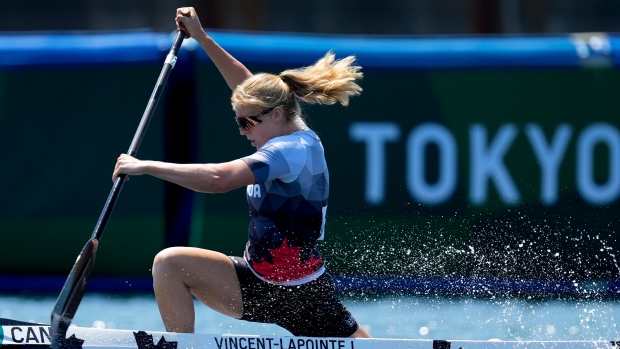Aug 4, 2021
Vincent-Lapointe, Vincent advance to canoe semis
Laurence Vincent-Lapointe's first race in more than two years was a resounding success, as both she and her teammate Katie Vincent advanced to the semis of the women's canoe single 200-metre race.
The Canadian Press

TOKYO — Laurence Vincent-Lapointe hadn't raced since June 1, 2019, and on Wednesday in Tokyo, she was nervous.
"I think it's normal," she said. "It's not only been two years since I last delivered a race, but it's also the first time that women's canoe has been at the Olympics.
"Whether you like it or not — even if you don't want to think about it — it always goes a bit in your head."
On the start line, her message to herself was: just concentrate on the race.
Vincent-Lapointe's first race in more than two years ended up being a resounding success, as both she and her teammate Katie Vincent advanced to the semis of the women's canoe single 200-metre race.
Vincent-Lapointe, a seven-time world champion at the distance, hadn't competed since the spring of 2019 due to the COVID-19 pandemic and a positive drug test that almost upended her career. She was cleared in January 2020 when the International Canoe Federation accepted she was the victim of third-party contamination.
The 29-year-old from Trois-Rivières, Que. marked a time of 45.408 seconds at Sea Forest Waterway, which was enough to win her heat and move her straight to the semifinals.
"I'm satisfied," she said. "I didn't know what to expect from my competitors, but I knew I had a strong heat. I concentrated on myself. I left with a good start."
Vincent, of Mississauga, Ont. also won her heat in a time of 46.391 and will move on to Thursday's semis. The top two boats in each heat moved directly to the semifinals, while the rest were sent to quarters for a second chance to qualify.
The fastest time belonged to 19-year-old American Nevin Harrison, who established an Olympic record in the new event with a time of 44.938 seconds.
Vincent-Lapointe holds the world record of 44.504, which she set in 2018. She has never raced Harrison, but appeared ready for the challenge.
"We'll see in the semifinal and final how we measure up," she said.
The story of Vincent-Lapointe's positive drug test is well known.
While the International Canoe Federation accepted her argument that trace amounts of the banned ligandrol was transferred to her via the body fluids of her ex-boyfriend, there was a question mark on whether her fellow athletes would welcome her presence. Thus far, she said, she's felt mostly acceptance.
"Honestly, most of them seem to be fine," she said. "I’ve had a lot people tell me they were happy I was here. For sure, there are some who — I don’t know if they’re frustrated of just focused on themselves, but who would not talk to me. But you know what? I proved that I could be here. I did everything in the past two years to be here. I think I deserve to be here, so if people are mad, there’s nothing I can do."
In her heart, Vincent-Lapointe said she always felt like she would compete at the Olympics.
"There’s been moments when I could have thought I wouldn’t make it, but deep down, I always felt I would make it. Even three years ago when I learned women’s canoe would be at the Olympics, I said that I would be there. Through everything that happened, I believed I would be here."
In other competition, Michelle Russell of Fall River, N.S., qualified for the semifinals of the kayak single 500 metres after finishing third in her quarterfinal.
On the men's side, Toronto's Nicholas Matveev qualified for the semifinals after finishing second in his quarterfinal heat for the men's kayak single 200-metre. Mark de Jonge of Halifax failed to advance after placing third in his quarterfinal heat.
Quebec's Vincent Jourdenais and B.C.'s Brian Malfesi finished sixth in their heat in the men's kayak double 1000-metre race, but came fourth in their quarterfinal to miss the semifinals. They'll participate in the B final.
This report by The Canadian Press was first published Aug. 4, 2021.
